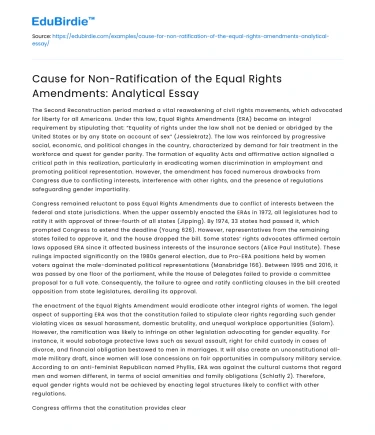The Second Reconstruction period marked a vital reawakening of civil rights movements, which advocated for liberty for all Americans. Under this law, Equal Rights Amendments (ERA) became an integral requirement by stipulating that: “Equality of rights under the law shall not be denied or abridged by the United States or by any State on account of sex” (Jessiekratz). The law was reinforced by progressive social, economic, and political changes in the country, characterized by demand for fair treatment in the workforce and quest for gender parity. The formation of equality Acts and affirmative action signalled a critical path in this realization, particularly in eradicating women discrimination in employment and promoting political representation. However, the amendment has faced numerous drawbacks from Congress due to conflicting interests, interference with other rights, and the presence of regulations safeguarding gender impartiality.
Congress remained reluctant to pass Equal Rights Amendments due to conflict of interests between the federal and state jurisdictions. When the upper assembly enacted the ERAs in 1972, all legislatures had to ratify it with approval of three-fourth of all states (Jipping). By 1974, 33 states had passed it, which prompted Congress to extend the deadline (Young 626). However, representatives from the remaining states failed to approve it, and the house dropped the bill. Some states’ rights advocates affirmed certain laws opposed ERA since it affected business interests of the insurance sectors (Alice Paul Institute). These rulings impacted significantly on the 1980s general election, due to Pro-ERA positions held by women voters against the male-dominated political representations (Mansbridge 166). Between 1995 and 2016, it was passed by one floor of the parliament, while the House of Delegates failed to provide a committee proposal for a full vote. Consequently, the failure to agree and ratify conflicting clauses in the bill created opposition from state legislatures, derailing its approval.
The enactment of the Equal Rights Amendment would eradicate other integral rights of women. The legal aspect of supporting ERA was that the constitution failed to stipulate clear rights regarding such gender violating vices as sexual harassment, domestic brutality, and unequal workplace opportunities (Salam). However, the ramification was likely to infringe on other legislation advocating for gender equality. For instance, it would sabotage protective laws such as sexual assault, right for child custody in cases of divorce, and financial obligation bestowed to men in marriages. It will also create an unconstitutional all-male military draft, since women will lose concessions on fair opportunities in compulsory military service. According to an anti-feminist Republican named Phyllis, ERA was against the cultural customs that regard men and women different, in terms of social amenities and family obligations (Schlafly 2). Therefore, equal gender rights would not be achieved by enacting legal structures likely to conflict with other regulations.
Congress affirms that the constitution provides clear laws to safeguard women's rights and gender parity. The 19th amendment gave all Americans the civil freedom to vote and engage equally in all social, economic, and political activities (Ginsburg). In the 21st century, social organizations, such as ‘#MeToo’ and ‘Time’s Up Movements,’ are harnessing the quest for women empowerment, corporate diversity, and legal gender protection (Weiss). However, Congress continues to review the unremitting debate on ERA’s suitability and potency to create redundant laws supporting the impartiality of men and women. Consequently, it has withheld the bill’s sessions based on its legality by affirming that equal rights had already been granted by the constitution using such legislation as Civil Rights Acts of 1964, which advocated for liberty for all regardless of race, gender, national origin, sexual orientation, religion, ethnicity, physical disability (Brown 528). Therefore, this Act guarantees women entitlements by providing clearer gender protection guidelines, which eliminates the applicability of ERA.
Equal Rights Amendment (ERA) aims to promote gender equality in the U.S., by eradicating vices such as women violence and promoting equal opportunities in social, economic, and political spectrums. However, Congress has failed to pass it due to conflicting interests in both state and federal houses, likely infringement of other women rights, and the presence of constitutional laws safeguarding gender liberty. Nevertheless, the onset of a collaborative approach from equal rights movements, women in political leadership, and social media integration is a positive step towards realizing Congress approval.
Works Cited
- Alice Paul Institute. “History of the Equal Rights Amendment”, n.d., www.equalrightsamendment.org/the-equal-rights-amendment
- Brown, Paulette. 'The Civil Rights Act of 1964.' Washington University Law Review, vol. 92, no.2, 2014, pp. 527-552.
- Ginsburg, Ruth “The Need for the Equal Rights Amendment,” American Bar Association Journal, 59, 1973, pp. 1013-1019.
- Jessiekratz, “Failure of the Equal Rights Amendment: The Feminist Fight of the 1970s.” September 22, 2014, https://prologue.blogs.archives.gov/2014/09/22/failure-of-the-equal-rights-amendment-the-feminist-fight-of-the-1970s/
- Jipping, Thomas “Why the Old Equal Rights Amendment Is Not Viable” The Heritage Foundation, Jul. 1, 2019, www.heritage.org/the-constitution/commentary/why-the-old-equal-rights-amendment-not-viable
- Mansbridge, Jane. “Myth and Reality: The ERA and the Gender Gap in the 1980 Election” The Public Opinion Quarterly, vol. 49, no. 2, 1985, pp. 164-178.
- Salam, Maya “What Is the Equal Rights Amendment, and Why Are We Talking About It Now?” The New York Times, Feb. 22, 2019, www.nytimes.com/2019/02/22/us/equal-rights-amendment-what-is-it.html
- Schlafly, Phyllis “What’s Wrong with ‘Equal Rights’ for Women?” Eagle Forum, vol. 5, no, 7, 1972, https://eagleforum.org/wp-content/uploads/2017/03/PSR-Feb1972.pdf
- Weiss, Laura. “A New Era for the ERA?” Roll Call, May 23, 2019. www.rollcall.com/news/congress/new-era-era
- Young, Neil. '’The ERA Is a Moral Issue’: The Mormon Church, LDS Women, and the Defeat of the Equal Rights Amendment” American Quarterly, vol. 59, no. 3, 2007, pp. 623-644.






 Stuck on your essay?
Stuck on your essay?

